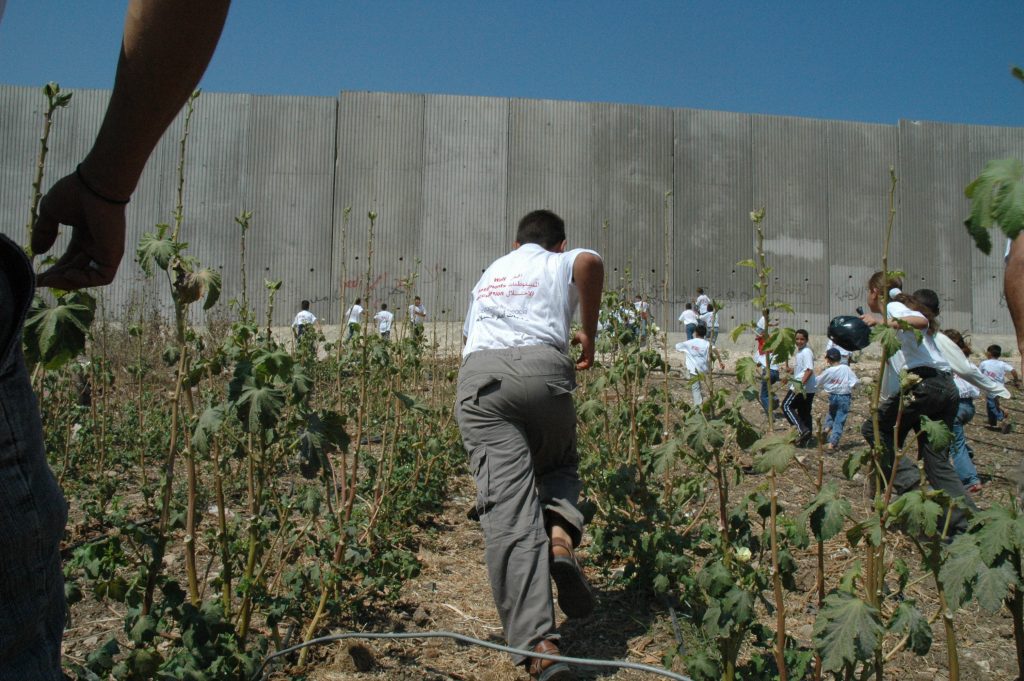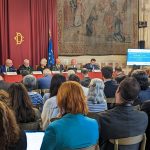I always search for comedic relief. This is one of the reasons why I have supported the work of Noam Shuster, a Jewish Israeli with Persian and Romanian roots who has been working intently on a one-woman comedy show—“Coexistence My Ass!”—intended both to expose and transgress the ideological boundaries constraining the possibility of reimagining the cohabitation of Israelis and Palestinians.
Shuster became infected with COVID on her way back to Tel Aviv from New York. She subsequently documented her ordeal on video, first in self-quarantine at home, followed by 24 hours at the Hadassah Hospital in Jerusalem, and then two weeks in a place she affectionately called “the Corona Hotel,” where people mildly symptomatic or asymptomatic reside until they produce two negative tests. Her video clip, which trended on CNN, shows her surprise as she enters the lobby and immediately encounters the commotion of an actual (not on Zoom) Zumba class. She likewise smiles sardonically at the absurdity of being probably the only comedian in the world doing a comedy routine in front of a live (even if sick) audience.
No stranger to coexistence as a project
This is not the only absurdity Shuster observed. Both on the video clip and in private conversations and subsequent interviews, she commented on the transformative dimensions of her experience. It was transformative to someone who built her comedic career upon the landscape of divisions and hate, but who was confronted at the Corona Hotel by an amazing cacophony of people. They represented a whole spectrum of the complex Palestinian and Israeli sociocultural and religious landscapes, from Haredi Jews to Palestinian nurses, doctors, and other residents of Jerusalem.
The experience in the Corona Hotel, on Shuster’s account, was transformative because it forced her to suspend what she referred to as her cynicism, that is, her disillusion with lofty claims about peace and coexistence that often only conceal ugly realities of racism, injustice, and enduring occupation.
Shuster is no stranger to coexistence as a “project.” In fact, she grew up, speaking Arabic and Hebrew, in a unique village called Oasis of Peace or Neve Shalom (in Hebrew) and Wahat al-Salaam (in Arabic). This upbringing, living with Palestinians, equipped her with the ability to communicate, through Arabic comedy, with broader audiences in the Middle East. Captivated by the promise of the Oslo Accords signed in 1993, her parents moved to Oasis of Peace when she was a young girl.
Of course, the “promise of Oslo” turned out to be another name for “continued occupation.” Decades later, she chose the provocative title of her comedy show to convey her conviction that in the context of Israel/Palestine, “coexistence” is a trope masking the political violence undergirding and further entrenching the occupation of Palestine and foreclosing the possibility of justice and dignity for all, including marginalized Israelis such as the Mizrahi and Ethiopian communities.
As a Mizrahi activist in a “peace camp” otherwise dominated by Ashkenazi Israeli Jews, Shuster connects to these communities. As Mizrahi feminist scholar Smadar Lavie has argued, this “peace camp” reflects an Ashkenazi failure to connect urgent social justice issues within the so called Green Line of 1948 with the occupation of the West Bank, the Gaza Strip, East Jerusalem, and the Golan Heights. Significantly, this failure delimits the possibility of imagining solidarities that transcend narrow ideological boundaries. My own research has elaborated on this disillusioning “failure to connect.”
How is this night different than other nights?
For Shuster, however, the walls of the quarantined hotel provided an opportunity for organic human interaction. This is quite ironic, especially considering that during her stay there, the residents of the hotel celebrated the Passover Seder, when Jews ask: “How is this night different from other nights?” Within the walls of a COVID captivity, the response, so to speak, was: “we actually see one another as fully humans, with all our sadness and pain.”
How is this experience different from all the other experiences of “coexistence”? For Shuster, the most compelling aspect of this ordeal was a sense that it was not a “project” like her manicured Oasis of Peace and multiple other opportunities she has had as a participant in a plethora of people-to-people activities and as a token representative in multiple “peace” conferences in the US and other global stages. By contrast to these staged or performed activities, the relatively organic nature of the human interaction in the Corona Hotel seems to lend itself to hope against the depth of disillusionment and sarcasm.
Might some measure of hope be derived from this quarantined utopia of simply being stuck together?
On the other hand, that night was absolutely no different than any other night under Israeli occupation. Testing facilities in East Jerusalem were shut down, and Gaza remained under blockade in anticipation of catastrophic scenarios. This was the bitter harvest of decades of military occupation, restrictions imposed on donor agencies, and the US-led hollowing out of UNRWA (the UN agency designed to care for the needs of Palestinian refugees)—all of which resulted in a fragmented health system and fewer than 120 ventilators for 3.2 million people in the West Bank. Despite rhetoric to the contrary, COVID- 19 resulted in enhanced securitization of Palestinians who nevertheless continue to organize from the ground up to facilitate mutual aid practices, thereby reclaiming their own agency and defining their existence as resistance.
Not “nowhere”
Not for one moment, did Shuster think of the Corona Hotel as utopia. It is not “nowhere” but very concretely somewhere. Even knowing that Passover in the Corona Hotel was just another night of un-freedom, might some measure of hope be derived from this quarantined utopia of simply being stuck together? In all its absurdities, from live comedy shows and Zumba classes the Corona Hotel represents for Shuster a place and a moment in time where people simply recognized one another’s humanity and vulnerability. It is not a funded project of coexistence. It is real.
For the Jewish French philosopher Emmanuel Levinas, the face of the Other became a site of ethical relationship-building. In his Totality and Infinity, Levinas writes “the Other faces me and puts me in question and obliges me” (207). This is not a simplistic contact thesis but rather an argument about ethical obligations to others that consolidate through the centrality of the experience of seeing the Other’s face.
While Levinas has been criticized for the ways in which his interpretation of Jewish Zionism constrained his own ability to respond to Palestinians’ ethical demands, his ethics of obligation, prompted by seeing the face of the Other, is nothing like feel-good myopic arguments about seeing, momentarily, a common humanity in others. Levinas’ ethic would be no more than this, and worse, were it to traffic with the language of erasure and thereby conceal how the Israeli leadership uses the cover of Corona to pursue its ideological agendas. If the dynamics of power are occluded under the veil of a generic “common humanity”—the virus as the great equalizer, say—then seeing the face of the Other-qua-human means nothing more than a little excursion, not unlike the massive industry of people-to-people peacebuilding in Israel/ Palestine. Of course, “seeing” the face as a ground for an ethical obligation is a burden for Israeli Jews to carry as they pave an alternative path for cohabitation, based not on erasure of historical injustices through appeals to some generic humanity and precariousness, but rather through grappling with complicity— as various interlocutors have argued recently here, here, and here.
Stuck together
Yes. Everybody in the Corona Hotel was infected with the same virus. Together they were all trying to heal, a moment of vulnerability and humanity that coexisted with the darkness of decades of what Palestinians call the ongoing Nakba, referring to the Catastrophe of 1948 as enduring, not simply as a moment in history when Israeli pre-state militia ethnically cleansed Palestinian lands. As people already infected, the people in the Corona Hotel did not need to fear actual human interaction. Tragically, they were stuck together–an embodied metaphor for the whole region as a site of conflict and/or occupation now more than 70 or 100 years old (depending on when you start counting).
Seeing the other’s face in a quarantined utopia is not meaningless. Rather, this little island of humanity becomes a site of mature hope.
Yes, the ironies abound. Outside the quarantined utopia, the Israeli leadership enhanced the occupation of Palestinians in a blatant violation of international law through US-sanctioned formalized annexation while consolidating Netanyahu’s reign yet again (and despite an indictment). Sadly, we continue to see the ongoing Nakba as threatening people’s dignity under multiple veils of security, which dehumanize one group of people through the valorization of another’s dignity in ways that unsettle the ethical imperative of the face.
‘There is a crack in everything,’ sings Leonard Cohen. ‘That’s how the light gets in.’
Seeing the other’s face in a quarantined utopia (“nowhere”) is not meaningless. Rather, this little island of humanity becomes a site of mature hope. Being stuck together must translate into an obligation to disturb the layers of violence that made last month’s Passover celebration in the Corona Hotel a night just like all other nights—but a night illuminated by the hope of breaking through those horrid, unnatural barriers we seem to love building. “There is a crack in everything,” sings Leonard Cohen. “That’s how the light gets in.”
Atalia Omer is professor of religion, conflict, and peace studies. Her research interests include the theoretical study of the interrelation between religion, nationalism, and conflict and religion and the practices of peace.
This article is part of a series of blog posts published by the Keough School of Global Affairs. Dignity and Development provides in-depth analysis of global challenges through the lens of integral human development.
Photo by Justin McIntosh.



